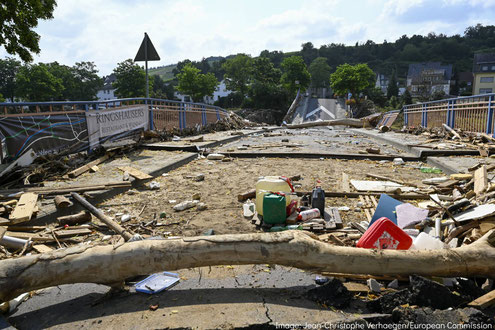
I was on a journey from Frankfurt to North Rhine-Westfalia on 15 July and wondering about massive delays and cuts in train travel before I learned that the night before, super heavy rainfall led have posed torrential floods in parts of Germany. More than 180 people died, homes, roads, and other infrastructure has been washed away in the unprecedent flooding, and with it, people’s and businesses’ existences – while I was just struggling with a few hours of delay.
How could that happen in Germany? Yes, we as experts knew that it could (theoretically), but seeing the real pictures left me speechless. How to clean up whole towns and recover after such impact? It needs to go fast as people suffer and the winter is about to come. Despite all efforts, even basic infrastructure is still fragile in the region. The federal government has set up 30 billion EUR in support of the recovery, and insurances (as long as you have had one against such events) are paid.
Speeding up in repairing is urgently needed. At the same time, I worry how this may be done. Does it always make sense to rebuild at the same places and in the same way? Climate experts predict that such extreme events will happen far more often in the future and as it gets harder and harder to reach the Paris 1.5 degree target, these predictions will get even worse. What will happen with these houses during the next flooding? Can we really expect that once they are rebuilt, some kind of added public measures (which?) will provide sufficient protection even for the ones built close to smaller and bigger streams? Could measures like retention basins be built at scale? Can sufficient space be found for them? …

What I mostly miss in all the discussions are ways to rebuild better and to build houses in a climate-resilient way. The event was a shock. Private and public property owners, service providers, planners and deciders do not have elaborated solutions at hand and there is simply no time to think long enough about it to find them. People need shelter and want to return to their lives.
How can we get out of this vicious circle? For other regions, I hope this event has worked as a wake-up call, and they develop and finally implement adaptation measures appropriate to deal with the scale of projected impacts now. For the affected regions, I am not sure. How to get out of the conflict between the need to act immediately and lacking complex solutions?
